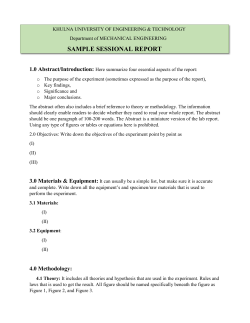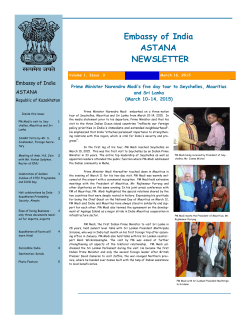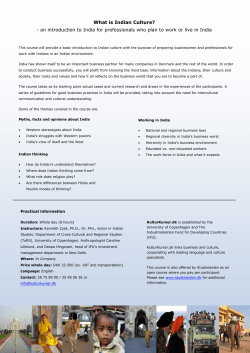
AA-Postscript 2.qxp:Layout 1
TUESDAY, NOVEMBER 18, 2014 I N T E R N AT I O N A L Murder for ‘honor’ Bloody tide sweeping Pakistan SYDNEY: Prime Minster of India Narendra Modi acknowledges thousands of supporters at the Allphones Arena Olympic park in Sydney yesterday. Thousands of Indian community members gathered at the arena to listen to Modi who is in Sydney after attending the G20 Summit in Brisbane over the weekend. —AFP Fans dub India’s Modi ‘rock star’ in Australia SYDNEY: Thousands of rapturous supporters yesterday flocked to hear a public address by Narendra Modi on the first visit by an Indian prime minister to Australia in 28 years, many declaring their love for him. Modi, who won India’s biggest electoral victory in three decades in the April-May polls, was greeted like a pop star on a trip to New York in September and received a similar reception in Sydney, which he is visiting after attending the G20 summit in Brisbane. “Modi’s a rock star!” screamed one supporter as the Indian premier took the stage to a wildly enthusiastic reception. “This love, this welcome... I give this to the feet of the children of mother India,” Modi said, observing that many people were still outside, unable to gain access to the packed venue. Modi drew cheers from the crowd when he referenced the two nations’ shared passion, saying neither “Australia nor India can live without cricket”. His speech also covered topics such as Hindu nationalism and Indian independence. “He is our most charismatic leader and he is going to take our country to the next generation,” Sushil Chaddha, an IT consultant who has lived in Australia for three decades, told AFP in stifling heat outside Sydney’s Olympic Park. ‘We all love him’ Beside Chaddha stood dozens of people wearing “Modi in Australia” T-shirts printed with the Indian leader’s face in the style of Barack Obama’s “Yes We Can” 2008 election posters. Others chanted “Modi, Modi, Modi!” as they jumped, sang and danced, with drums and music playing in the background. Some 20,000 people, mostly from the Indian diaspora in Australia, jammed the stadium, although some had travelled from as far as the United States, Singapore and New Zealand. Reports said there were 25 television crews from India at the event. Scores of supporters arrived on a train decked out in the country’s national colors. Modi Express hits Sydney The so-called “Modi Express” saw more than 200 supporters board a train from Melbourne for the 12-hour journey to Sydney, singing and dancing in the carriages ahead of the event. “After a long, long time, such a phenomenon, such an excitement, such a wave has come, which is unparalleled,” one of Modi’s supporters on the train, Rakesh Raizada, told the Australian Broadcasting Corporation. “This is a new revolution, you can call it.” There are around 450,000 people of Indian origin in Australia, including many from the student community, and Australian Prime Minister Tony Abbott will be rolling out the red carpet for Modi in Canberra today. His trip Down Under-for the G20 summit in Brisbane and a state visit-comes just two months after Abbott’s tour of India, during which the two countries sealed a long-awaited nuclear energy deal. Relations between India and Australia have been rocky in recent years with tensions flaring over allegedly racist attacks on Indian students in Melbourne, and two-way trade has done nothing but slide. But the Abbott government sensed an opportunity when the pro-business Modi won the Indian elections in a landslide in May, and is keen to reignite Australian investment in India. India’s foreign ministry described Modi’s visit as part of efforts to “re-engage” Australia and its businesses, and he will address parliament in Canberra today. The Indian leader is also set to meet industry leaders and sign several agreements on narcotics control, social security, tourism and cultural cooperation. While Modi was largely feted, not everyone at the stadium was there to welcome him, with about 100 Sikh protesters lining a street beside the entrance. “The main message is unity,” Karandeep Singh Chadha said. “PM Modi and his associates are involved in pro-Hindu movements that are trying to squash minorities.” —AFP Long-troubled Afghanistan govt undergoes overhaul KABUL: Afghan President Ashraf Ghani has missed his own deadline for naming a Cabinet as he undertakes a major overhaul of his country’s government, which officials and analysts say has long suffered from a focus on patronage rather than policy. The delay has raised concerns that Ghani and his former rival Abdullah Abdullah now in the prime minister-like post of chief executive cannot agree on who should take what Cabinet post. But diplomats and officials say the two leaders are restructuring the administration to focus on security, the economy and social policy ahead of a vital donor conference in December. “There is no deadlock or difference of opinion,” said Mujib Rahman Rahimi, Abdullah’s spokesman. It takes time “to consider how to fill these positions in order to have a functioning, professional Cabinet.” Senior advisers are being appointed, regulatory authorities set up, ministers’ duties defined, and some of the 24 ministries merged to possibly as few as 18, officials and analysts said. Only when these tasks are complete can “the right people with the right skills be appointed to the right jobs,” said another official close to Abdullah, who spoke on condition of anonymity to speak frankly about internal discussions. Ghani became president in September, promising to reverse the legacy of corruption and nepotism of his predecessor Hamid Karzai’s 13 years in office. He inherited an anemic economy, endemic corruption, a lack of public trust in government and a still-virulent Taleban insurgency as US and NATO combat troops prepare to withdraw at the end of the year. Ghani said he would appoint his Cabinet within 45 days, but that deadline passed Thursday. He has met with around 80 percent of senior officials and asked each to explain the functions and responsibilities of their institutions, Ghani’s spokesman Nazifullah Salarzai said. “They all said there was no political will to have an institution that functioned normally and accountably,” Salarzai said. Ghani already has appointed former Interior Minister Mohammad Hanif Atmar as national security adviser and acting Finance Minister Hazrat Omar Zakhilwal as national finance adviser. Women are expected to take a number of senior positions, while the Women’s Affairs Ministry, widely derided as ineffectual, could be among those to go, a number of officials said. Ghani and Abdullah want to name most of the Cabinet before they meet international donors in London in December to secure funding for post-war development, said a Western ambassador, speaking on condition of anonymity to talk about internal Afghan discussions. At the London conference, Ghani will be expected to demonstrate progress on reform, including graft and security. —AP SUKKUR: Razia Shaikh looks up to the sky, her eyes glistening with tears and a Quran in her lap, seeking divine justice for one missing daughter and another slain by vengeful relatives in the name of “honor”. The widow, in her 40s, wails as she shows two photos of her daughter-brighteyed and vivacious in one, in the other cold and lifeless, shrouded in her white burial cloth. Shaikh is one of countless mothers to suffer the misery of “karo-kari”, murders carried out supposedly to preserve family honor or avenge some perceived slight. The Aurat Foundation, a campaign group that works to improve the lives of women in Pakistan’s conservative, patriarchal society, says more than 3,000 have been killed for “honor” since 2008. Marriage and murder Sitting on a traditional charpoy bed outside her one-room home in Sachal Shah Miani village, off the bank of the River Indus in southern Sindh province, Shaikh recounts her tale of woe. It began when her elder daughter Khalida went missing from the home of her inlaws in the southern port city of Karachi in 2010. What became of Khalida is unclear, but the in-laws blamed Shaikh, a widow struggling to keep her dignity despite extreme poverty. As Shaikh was grieving for her missing daughter, her in-laws started demanding she marry her younger daughter Shahida to another of their sons. Shaikh refused and three men broke into her home, shooting her second daughter in the back. They justified the murder by accusing her of adultery and have not been punished. “For the sake of Allah I appeal to the ministers, the judges and the police to get me justice,” said Shaikh, weeping. Government efforts to crack down on these attacks have had little success and the killings remain a particular problem in poor and rural areas of Pakistan. In the absence of material wealth, concepts of honor and preserving the family’s good name are highly valued. Moreover, Pakistani law allows the relatives of a victim to “forgive” the killer in return for blood money-meaning that if the relatives themselves have arranged the killing, prosecution can be avoided. Marriages in Pakistan are usually arranged and often take place between cousins, which can add a further motive in the form of rows over dowries. Irum Awan, a female police officer, heads a special force set up in Sindh in 2008 to fight the menace. “In most cases, ‘honor’ is just a pretext whereas the real motive is that they don’t want to give the shares in property to their sister or daughter,” Awan said. capture my land,” Hasan said in a tiny house, located in a scruffy alley by an open sewer. The landlord sent his men to threaten Hasan, giving him the choice of surrendering his land, his only source of income, or paying 800,000 rupees ($8,000) to settle the dispute-or face the consequences. “My life is in dangerthey have already attacked me three times,” Hasan said. “I am a poor man, I am just sitting at pects are able to work the system to avoid justice. “Some days ago we conducted, you won’t believe, more than 10 raids to arrest a person who killed his wife,” she said. “But when we produced him before the honorable judge, he released him on bail.” Annually, estimates suggest more than 350 murders are committed in the name of honor in Sindh. “If you look at the Sindhi newspapers, two to three inci- SUKKUR: Pakistani villager Razia Shaikh, one of countless mothers to suffer the misery of “karo kari”, shows a photograph of her daughter during an interview with AFP in Sukkur. —AFP Feudal ties It is not only women who suffer and not only matters of love and marriage that lead to such killings. Criminal justice in Pakistan is deeply mired in local politics, particularly in areas like Sindh where society remains largely feudal, with huge power concentrated in the hands of big hereditary landowners. And questions of “honor” can be invoked to settle other unrelated disputes. In a small village west of the town of Sukkur, Mohammad Hasan lives in hiding after being declared “karo” by the local feudal landlord. “I was declared karo after a dispute that started about land which was mine. They wanted to home and hiding here and there. He is an influential man, he can do anything with me.” The abuse of women and poor men under the guise of “honor” has gone on for centuries across South Asia, but the British colonial rulers suppressed the practice. “In the British rule, they would hold responsible and round up the whole village where the karo-kari would take place, and thus the menace vanished during that time,” said Javed Alam Odho, the police chief of the Sukkur region. But now weak law enforcement and poor prosecution, often influenced by powerful people, keep the killers at large.Awan admits her frustration at the way sus- dents are reported daily and this is a routine,” said Khalid Banbhan, bureau chief of Ibrat, a prominent Sindhi-language daily. “Hardly there is a day when no report appears in the newspapers about karo-kari.” Covering the problem in rural areas is a challenging task for local journalists, who are exposed to the wrath of local feudal chieftains who are usually power ful enough to have troublemakers punished, or even killed, with few repercussions. Banbhan referred to a case in which a journalist received death threats after reporting a case of a landlord holding a village council that sentenced two women to death after declaring them “kari”.—AFP
© Copyright 2025


















